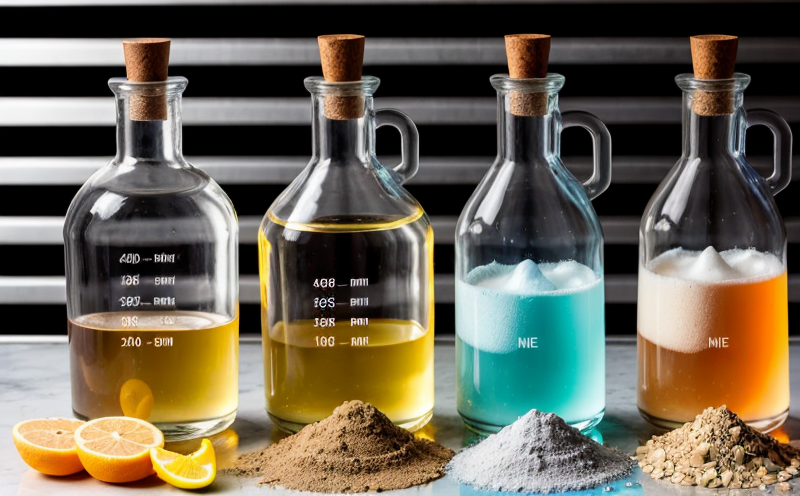BS EN 62620 Electrolyte Analysis of Large Secondary Lithium Cells
The battery testing industry has seen significant growth over recent years, driven by the increasing demand for high-performance, safe, and reliable lithium-ion batteries. Lithium cells used in large secondary applications, such as electric vehicles (EVs) and energy storage systems (ESS), are subject to stringent quality control measures before they can be deployed in commercial use.
BS EN 62620 is a European standard specifically designed for electrolyte analysis of large secondary lithium cells. This standard ensures that the electrolyte used within these cells meets the necessary safety, performance, and compatibility criteria. By adhering to this standard, manufacturers can provide batteries with consistent quality and reliability.
The electrolyte plays a crucial role in the battery's overall performance. It is responsible for conducting ions between the positive and negative electrodes during charging and discharging cycles. The correct composition of the electrolyte ensures optimal battery operation while minimizing safety risks.
Compliance with BS EN 62620 not only enhances product quality but also facilitates smoother regulatory compliance processes, enabling manufacturers to enter new markets more efficiently. This standard is particularly important for companies operating within the automotive and renewable energy sectors where stringent performance and safety requirements are paramount.
The testing process outlined in BS EN 62620 involves several steps aimed at evaluating key parameters of the electrolyte, including its composition, purity, viscosity, and compatibility with specific types of lithium cells. These tests help identify any potential issues that could affect battery performance or safety during real-world usage scenarios.
For instance, testing for impurities ensures that contaminants do not interfere with normal charging cycles or reduce battery lifespan. Viscosity measurements are essential because they impact how quickly ions can move through the electrolyte, affecting both charge rate and overall efficiency. Compatibility testing checks whether the chosen electrolyte works well with particular cathode materials used in large secondary lithium cells.
Given the complexity of modern batteries and their role in critical applications like electric vehicles and renewable energy storage systems, it's crucial for manufacturers to ensure they comply fully with all relevant standards such as BS EN 62620. Failure to do so could result in non-compliance penalties or even product recalls if safety issues arise.
To summarize, compliance with BS EN 62620 is vital for maintaining high standards of electrolyte quality and ensuring safe, efficient operation of large secondary lithium cells across various industries. By adhering to this standard, manufacturers can gain competitive advantages by delivering superior products that meet stringent international requirements.
Why It Matters
The significance of BS EN 62620 electrolyte analysis in the context of large secondary lithium cells cannot be overstated. As mentioned earlier, compliance with this standard ensures consistent quality and reliability across all batches produced by manufacturers. This consistency is critical given that even minor variations in electrolyte composition can lead to significant performance differences or safety concerns.
- Enhanced Safety: Ensures the electrolyte does not contain harmful impurities that could pose risks during operation.
- Better Performance: Optimizes ion flow within the cell, leading to improved charging rates and extended battery life.
- Regulatory Compliance: Facilitates easier entry into regulated markets by meeting strict international standards.
The importance of these factors extends beyond mere technical specifications; they directly influence customer trust and satisfaction. Consumers are increasingly aware that the quality of their EVs or ESS systems depends heavily on reliable battery performance, which in turn is linked to proper electrolyte analysis.
Moreover, compliance with such standards demonstrates a commitment to excellence among manufacturers, thereby enhancing brand reputation. In today’s competitive marketplaces, where consumer confidence plays a key role in purchasing decisions, being able to point towards adherence to recognized international norms can make all the difference.
Scope and Methodology
| Test Parameter | Description |
|---|---|
| Composition Analysis | Determines the exact chemical makeup of the electrolyte, ensuring it meets specified requirements. |
| Purity Check | Evaluates any impurities present in the electrolyte that might affect battery performance or safety. |
| Viscosity Measurement | Metric for assessing how easily ions can move through the electrolyte, impacting charging efficiency and cycle life. |
| Compatibility Testing | Evaluates whether the chosen electrolyte works effectively with specific cathode materials used in lithium cells. |
The scope of BS EN 62620 electrolyte analysis covers various aspects critical to maintaining high standards for large secondary lithium cells. These include compositional analysis, purity checks, viscosity measurements, and compatibility evaluations. Each test contributes uniquely towards ensuring the best possible performance and safety profile for these batteries.
Competitive Advantage and Market Impact
- Ethical Compliance: By adhering to international standards like BS EN 62620, companies can build trust with customers who value transparency and integrity in manufacturing processes.
- Innovation Leadership: Meeting such stringent requirements pushes manufacturers to innovate continuously, developing new technologies that push boundaries further.
- Increased Efficiency: Through precise electrolyte analysis, batteries operate more efficiently, reducing energy waste throughout their lifecycle.
- Better Safety Profile: Ensuring compliance helps prevent accidents and recalls due to defective products, thereby protecting both reputation and finances.
The market advantage derived from complying with BS EN 62620 is substantial. It allows companies to differentiate themselves in crowded markets by offering safer, more efficient products that meet the highest industry standards. Such advantages translate into higher customer satisfaction levels, increased sales volumes, and long-term profitability.





